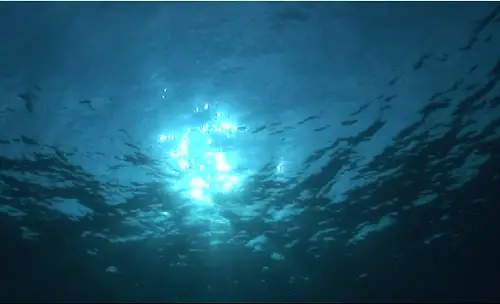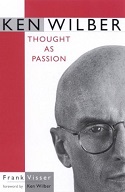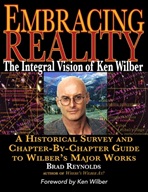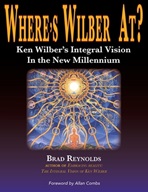TRANSLATE THIS ARTICLE
Integral World: Exploring Theories of Everything
An independent forum for a critical discussion of the integral philosophy of Ken Wilber
  Frank Visser, graduated as a psychologist of culture and religion, founded IntegralWorld in 1997. He worked as production manager for various publishing houses and as service manager for various internet companies and lives in Amsterdam. Books: Ken Wilber: Thought as Passion (SUNY, 2003), and The Corona Conspiracy: Combatting Disinformation about the Coronavirus (Kindle, 2020). Frank Visser, graduated as a psychologist of culture and religion, founded IntegralWorld in 1997. He worked as production manager for various publishing houses and as service manager for various internet companies and lives in Amsterdam. Books: Ken Wilber: Thought as Passion (SUNY, 2003), and The Corona Conspiracy: Combatting Disinformation about the Coronavirus (Kindle, 2020). Two Wilber Scholars Walk into a Bar…A Response to Brad ReynoldsFrank Visser
I am not denying spiritual experiences, I am questioning the metaphysical claims based upon them, especially when they conflict with science.
Brad Reynolds submitted two essays to Integral World intended to throw some light on the Wilber/Visser controversy about evolutionary theory: "Integral Visions" and "Partially True, Partially False". They are part of a series of essays to be published later this year. The first two of this planned series give me already some reason to comment, for Reynolds is wrongheaded about a couple of things related to my writings and the intention behind them. Before he gets into the heart of the matter—evolutionary theory, which isn't touched upon yet in these two essays—I'd like to clarify a few things up front. As Reynolds has commented in previous essays: Integral World is no longer integral because it focuses almost entirely on science. In integral parlance: only the eyes of mind and senses are used, not the "eye of Spirit". Only when this third eye is used, Reynolds contends, will Wilber's ideas about spiritual evolution or evolution as "Spirit-in-action" become obvious. He even accuses some Integral World authors of scientism and the denial of Spirit. "To deny Spirit and spirituality altogether is not integral" is his complaint. Let me state at the beginning that I am not denying spiritual experiences, I am questioning the metaphysical claims based upon them, especially when they conflict with science. Granting some sloppiness on the side of Wilber when discussing neo-Darwinism in no way justifies dismissing the integral vision as a whole, he adds. Again, let it be clear that I have never argued for such a thing. I take a differential approach to Wilber's ideas: some are brilliant, some are interesting but questionable, and some are just plain wrong.[1] David Lane once used an apt metaphor in one of his replies to Reynolds: you don't blame a car mechanic for focusing his attention to your car's flat tire. You don't exclaim: but you are ignoring the other tires, which are fine! 
Let me provide a silly, but useful analogy here that may clarify why Visser and myself have been so critical of certain aspects of Ken Wilber's work. If you are going to take a long-distance surf trip from Newport Beach to Cuatro Casas down in Baja, California (which is nearly 270 miles) you don't want to drive a car that has a flat tire, even if you think the other three are fine (though not thoroughly inspected or tested). As Frank Visser has repeatedly pointed out in a number of fine and incisive essays, Integral theory doesn't have much integrity if one of the fundamental spokes in its wheel is completely misaligned. It isn't myopic for a mechanic to fix your tire at the service station if that is the problem, just as it isn't short sightedness to point out Wilber's mistaken understanding of Darwinian evolution and how he presents it. Indeed, focusing on Integral theory's weaknesses is the very best thing one can do to help improve it. If we ignore the obvious (and not so obvious) mistakes and flaws in Wilber's oeuvre then we are doing him and his quadrant model a disservice.[2] As an example of grandiose metaphysical claims that are often made based on meditative experiences: claiming to be one or even identical with the World Ground or Supermind amounts to pathological inflation, according to me. At the very least these knowledge claims can't be accepted uncritically because the spiritual traditions use that terminology (and Wilber is fond of repeating them—implying to his readers or listeners that he has reached such lofty altitudes). It is like the drop claiming to be the ocean. Now, if it is just meant that the drop is made of the same stuff as the ocean, water, then I am fine with it, but that isn't such a huge claim either. Some modesty and humility are definitely in order here. And even a materialist would agree that we are made of star stuff. After all, all the heavier atoms we are made of have been created in exploding stars. Reynolds, however, has no reservations here whatsoever. He over and over again talks about becoming and being(?) one with God.
Now, if it is just meant that the drop is made of the same stuff as the ocean, water, then I am fine with it, but that isn't such a huge claim either. Some modesty and humility are definitely in order here.
Not only that, but that supposed mystical experience, would allow one to "integrate" science and spirituality. Not by denying science its useful but limited role, but by providing additional insights into reality, he maintains. Again, that's a knowledge claim I have questioned. What is this more than paying lip service to science? What is actually added by this approach? What if I tell you that my fourth eye has been opened and that I can now see that at the deepest level everything is blue? You can't see this because your fourth eye is still closed, that's why you deny this. But believe me, everything is blue at the deepest level. But it doesn't affect anything in reality. Just how is this an integration of spirituality and science? If I tell you that everything that exists is essentially an expression of blueness, what am I actually telling you? And what difference does this blueness actually make? What if it turned out not to exist at all? Would it actually make a difference in the real world?

Everything is blue at the deepest level. But it doesn't affect anything in reality.
In "Partially True, Partially False" Reynolds helpfully tries to summarize my major points of contention I have with Wilber as:
As the third bullet I would rather mention Wilber's tendency to claim support from famous scientists (Kauffman, Prigogine) for his vision of a creative universe. These points are dealt much in fuller details in a long essay submitted to Integral Review. In this longread I have phrased this as the three questionable strategies Wilber has followed to make his points:
I'd like to refer to that longer essay for quotes, references and arguments (it will be reposted on Integral World after publication).[3] “THE ROLE PLAYED BY SPIRIT IN EVOLUTION”
This brings me to the major disagreement I have with Reynolds—and it's an interesting one.
This brings me to the major disagreement I have with Reynolds—and it's an interesting one. He basically accuses me of criticizing a view Wilber actually doesn't hold, but occasionally seems to favor. In my opinion Wilber has introduced Spirit into the scientific arena by claiming science isn't capable of explaining this or that form of complexity, but the concept of Spirit would go a long way into doing just that. Spirit provides a "drive" or "pull" which gets matter to organize itself and transform into humans, even Shakespeare. Here's a seminal quote from Volume II of The Collected Works of Ken Wilber (1999). Note the words "pull", "force", "explain". Wilber sees Spirit as something that does work, and hence should be part of a true explanation:
I think of involution, then, along the analogy of a rubber band: stretch it, and you have involution, which supplies a force (namely Eros) that will then pull the two ends of the rubber band (matter and spirit) back together again—in other words, an involutionary force that will pull evolution along. But the actual route taken in that return, and all its wonderful variety, is a co-creation of every holon and the currents of Eros in which it fluidly floats.
Now, of course, you are perfectly free to believe in evolution and reject the notion of involution. I find that an incoherent position; nonetheless, you can still embrace everything in the following pages about the evolution of culture and consciousness, and reject or remain agnostic on involution. But the notion of a prior involutionary force does much to help with the otherwise impenetrable puzzles of Darwinian evolution, which has tried, ever so un-successfully, to explain why dirt would get up and eventually start writing poetry. But the notion of evolution as Eros, or Spirit-in-action, performing, as Whitehead put it, throughout the world by gently persuasion toward love, goes a long way to explaining the inexorable unfolding from matter to bodies to minds to souls to Spirit's own Self-recognition. Eros, or Spirit-in-action, is a rubber band around your neck and mine, pulling us all back home. (p. 12)
And here's another, more recent quote, from The Religion of Tomorrow (2017), where Wilber argues that the very existence of evolution is evidence for Spirit. Note the use of the words "inexplicable" and "evidence". Wilber is not just being poetic here, he really feels the concept of Spirit can illuminate our understanding of evolution.
Rational reasons to believe in this miraculous spiritual dimension to Reality include the following:
(a) the "creative advance into novelty" that is demonstrated by evolution itself and is inexplicable by mere "chance mutation" (the evolution from strings to quarks to subatomic particles to atoms to small molecules to massively interconnected molecules to asexual cells and early organisms—just for starters—is an awful lot of evolution in a universe that is supposed to be "running down" but can easily be seen as yet more evidence of creative Eros or Spirit-in-action, "a self-organizing self-transcendent drive," as Erich Jantsch put it). (p. 498) Finally, here's an older quote, taken from Eye to Eye (1983), which captures this sentiment in a nutshell. Spirit "plays a role" in evolution:
[T]he strict theory of natural selection suffers from not acknowledging the role played by Spirit in evolution. (Wilber 1983: 205).
This puts to rest Reynolds claims that I am selectively quoting from Wilber's works, especially from his recent videos (which he advises us to ignore, though he includes one himself!) or "when he is not at his best". No, it is a common theme in Wilber's written oeuvre, spanning many decades. Contrary to all this evidence, Reynolds holds that this is not really Wilber's view of how Spirit relates to the world. He quotes from A Brief History of Everything (1996) to make his point: Evolution occurs in the world of time and space and form, whereas Spirit's primordial nature is finally timeless and Formless, prior to the world of evolution but not other to it. We do not find Spirit or Emptiness by reaching some evolutionary Omega point in time, but rather by stepping off the cycle of time and evolution altogether (or ceasing to contract into it). Talking about selective quoting! Contrary to this, Wilber has argued for a more active role of Spirit, which is not only the Ground of all Being, but also the hidden drive behind evolution. In The Eye of Spirit (1997) he explains that the perennial traditions talked about how to experience the Spirit behind everything (Reynolds' favorite topic, he again and again returns to it), but lacked any coherent notion of evolution. When that idea caught on in the West, it was time for an upgrade, which Wilber calls "Neo-Perennialism", and which explicitly included the idea of evolution. SO, EMPTINESS IS DOING EXACTLY WHAT?
So we have a question for Ken Wilber. Which is it? Does Spirit have a noticeable effect on reality, especially in evolution, yes or no?
This "active" view of Spirit differentiated the neo-perennial philosophy from its predecessor the Perennial Philosophy, according to Wilber. Where Spirit was traditionally depicted as the passive Ground of Being, without any clear notion of evolution, in this more recent formulation Spirit is seen as both passive and active at the same time: passive-transcendent as World Ground and active-immanent as World Process. This Neo-Perennialist view was rather recent, “no more than a few hundred years old” and its precise origin is “almost impossible to pinpoint exactly”. It started with Hegel and Schelling, was taken up by Spencer and “applied to biology” by Darwin, before reappearing in Sri Aurobindo and Teilhard de Chardin, in Wilber's reading of the history of evolutionary thought. The problem here is, that these authors represent a speculative school of evolution, which is at odds with the understanding of science, especially Darwinian evolution. As I have argued recently, Wilber's scholarship regarding Darwin's contribution is lacking. He sees evolution as a spiritual phenomenon, which got obscured by the Darwinian theory of natural selection, but is now again revitalized by various modern schools of thought. He also, inconsistently, argues that Darwin was just providing evidence for the idea of evolution, which was in the air long before Darwin arrived on the scene. (Of course, you can't have it both ways: either Darwin provided evidence for a view or he obscured that view). Rather, Charles Darwin radically broke with these "transformationist" schools of thought, and proposed the theory of variation and selection. This does away with the need for any spiritual or metaphysical drive or push or impetus behind evolution.[4] Summing up: in my opinion Wilber's view of Spirit is that it is the missing ingredient in any explanation of the emergence of complexity over billions of years. Not only that, this concept provides "the only theory that can actually explain the mysteries of evolution". From The Religion of Tomorrow (2017):
Modern science now believes that evolution touches essentially everything in existence (even though it is lagging behind theoretically on exactly how to explain this)...
You can even see evolution as driven by "Spirit-in-action," which I think is the only theory that can actually explain the mysteries of evolution satisfactorily.
Notice again the occurrence of "explain", twice. Science is "lagging behind" theoretically, but Wilber will provide "the only theory". I counter that in my essays by saying this concept is question-begging and obviously not helpful in providing any deeper insight. It raises loads of questions. It doesn't qualify as a theory—whatever visionary qualities this notion otherwise might have. In contrast to this strong claim by Wilber, Reynolds makes a weaker claim: Spirit is not some entity doing this or that, but the Ground or Suchness of all that is. In that case, I wouldn't know why Wilber constantly tries to bring this up in contexts of science. How could emptiness or suchness have any noticeable effect on the world around us? If Spirit is behind everything that is arising, it is behind evolution, consciousness and love, but also behind entropy, extinction and erosion, not to mention the Corona virus, child abuse and serial killers! Are we any wiser now?
Emptiness does not affect the phenomenal stream at all because it is the emptiness of everything in that stream. — Ken Wilber
In an early interview for the Buddhist magazine The Lion's Roar (1996) Wilber once remarked this about how Spirit/Emptiness relates to the real world:
Emptiness does not affect the phenomenal stream at all because it is the emptiness of everything in that stream. There is no part of Emptiness separate from the manifest world to push or pull it. Emptiness is not a phenomenon over there, which we grasp or understand, and which understanding changes other phenomenon.
Emptiness changes nothing whatsoever, for the simple reason that it is not one item among other items but the nature of all items, with no exceptions. Emptiness leaves everything exactly as it finds it, because it is already the suchness of everything exactly as it is.[5] So we have a question for Ken Wilber. Which is it? Does Spirit have a noticeable effect on reality, especially in evolution, yes or no? No push, no pull? Based on my reading of Wilber, I choose the "Yes" answer as representing Wilber's view, and I have critiqued its usefulness accordingly. Reynolds opts for the "No" answer as the most accurate representation, and just wants to see all reality as identical to Spirit, if only one could see it with the Eye of Spirit. For both views Wilber quotes can be found. As I have argued before, Spirit is in the Eye of the Beholder, and should not be mixed with any matters of science. It is funny that two Wilber scholars like Brad and me (we both have written books about Wilber) disagree on this fundamental issue. Brad has turned to spirituality, and I have moved to the fields of science. Any integration of these two fields is still in the works. I very much appreciate Reynolds' efforts to join me in attempting to bring clarity to this issue, even if we might not get any closer at times. Perhaps a few drinks together might help solve these disputes much faster.
NOTES[1] Frank Visser, "Wilber or Truth?, How to Get Rid of Your Wilber Complex", May 2014 (talk at the 1st Integral European Conference, Budapest, 2014). [2] David Lane, "Integral Theory and Its Discontents, On reification, the limits of map making, reductive coloring, axiomatic argumentation, and the dangers of being cross-eyed", www.integralworld.net, February 2019. [3] Frank Visser, "Ken Wilber's Problematic Relationship to Science", Integral Review, www.integral-review.org, submitted for publication. Similar points have been made in: Frank Visser, "'No Way in Hell', Ken Wilber on the Naturalistic Approach to Evolution", www.integralworld.net, October 2019. [4] Frank Visser, "'Precisely nothing new or unusual', Ken Wilber on Darwin's Lasting Contribution", www.integralworld.net, November 2019. [5] Robin Kornman, "The World According to Ken Wilber", www.lionsroar.com, September 1, 1996.
|


